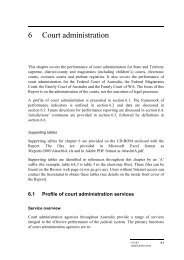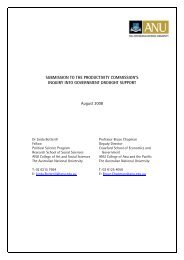Dr Emma Aisbett and Jonathan Bonnitcha (PDF - 202 - Productivity ...
Dr Emma Aisbett and Jonathan Bonnitcha (PDF - 202 - Productivity ...
Dr Emma Aisbett and Jonathan Bonnitcha (PDF - 202 - Productivity ...
Create successful ePaper yourself
Turn your PDF publications into a flip-book with our unique Google optimized e-Paper software.
well established. However, as we will discuss below, the cost‐benefit balance for states committing<br />
to extra protections for foreign investors is far less clear. For this reason, our submission also<br />
examines broader issues of welfare maximization.<br />
1.2 Background <strong>and</strong> Scope<br />
The most common post‐establishment protections in FTAs require host states to accord foreign<br />
investment fair <strong>and</strong> equitable treatment, national treatment <strong>and</strong> compensation for expropriation.<br />
This submission considers the merits of including such provisions in Australian FTAs. We also<br />
consider the merits of allowing these protections to be enforced through investor‐state dispute<br />
settlement.<br />
Five of Australia’s six current FTAs include post‐establishment protections. 3 There is a high degree of<br />
similarity between the sections of these five treaties that deal with investment protection, although<br />
there are also some important points of contrast. Four of these treaties grant foreign investors the<br />
right to bring claims against a host state for treaty breaches to investor‐state arbitration. Similar<br />
post‐establishment protections are contained in Australia’s twenty‐one Investment Promotion <strong>and</strong><br />
Protection Agreements (IPPAs). Accordingly, our analysis would also apply to any future (re)‐<br />
negotiations of IPPAs.<br />
It is true that each FTA raises issues that are specific to the particular negotiating parties involved.<br />
There may be particular concerns about the investment climate in a country that could justify<br />
including tailored post‐establishment protections in specific FTAs. However, country‐specific<br />
concerns of this sort do not seem to be driving either Australian or international practice in this area.<br />
Rather, the terms to which countries agree appear to be based on template negotiating positions<br />
that are offered equally to all countries. Because negotiating practice is driven by these generalised<br />
positions, we think it is useful to address the merits of post‐establishment protection at a general, as<br />
opposed to a country‐specific, level.<br />
This submission does not discuss other issues relating to foreign investment in FTAs. We do not<br />
address questions relating to foreign investment liberalisation, market access, free transfers of<br />
capital or limits on the use of performance requirements. We aim to offer a targeted contribution on<br />
the question of post‐establishment protection.<br />
2. The Impacts of TreatyBased, Postestablishment<br />
Protections for Foreign Investors<br />
In this section we outline the costs <strong>and</strong> benefits of treaty‐based, post‐establishment protections for<br />
foreign investors principally from the perspective of Australia. Within Australia there are several<br />
broad groups likely to be affected: Australians making investments in treaty partner countries, the<br />
Australian government (as a representative of the Australian public), <strong>and</strong> Australian businesses<br />
competing with foreign investors from treaty partners. Since we are discussing rules to protect<br />
foreign investors from the actions of the Australian government (which are made in either social or<br />
3<br />
Chapter 11 of the Australia‐US FTA; Chapter 11 of the Australia‐ASEAN‐NZ FTA; Chapter 10 of the Australia‐<br />
Chile FTA; Chapter 9 of the Thail<strong>and</strong>‐Australia FTA; Chapter 8 of the Singapore‐Australia FTA.

















